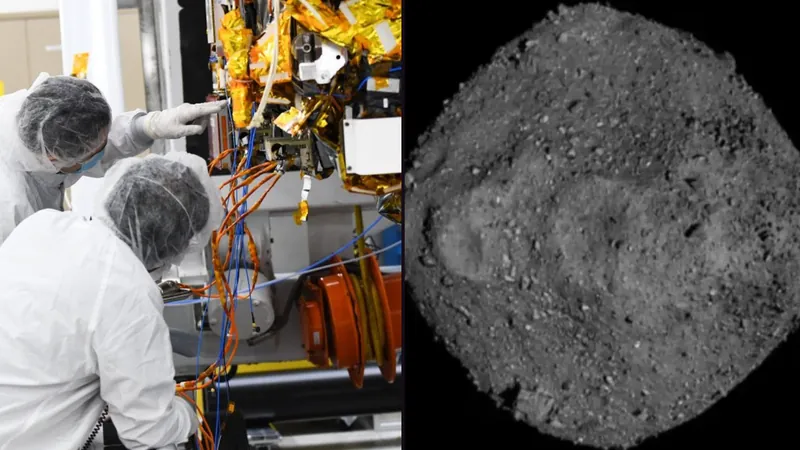
Unveiling the Secrets of Asteroid Bennu: NASA's $1 Billion Mission Yields Groundbreaking Discoveries!
2025-01-19
Author: Daniel
NASA's Historic Mission to Asteroid Bennu
NASA's recent mission to the asteroid known as 101955 Bennu has unveiled a treasure trove of scientific insights that could reshape our understanding of the solar system. The spacecraft OSIRIS-REx, launched in 2016, successfully touched down on Bennu in 2018, marking a historic moment in space exploration.
Sample Collection and Return
After gathering samples between October 20, 2020, and May 10, 2021, OSIRIS-REx returned to Earth on September 24, 2023. This monumental event came after an arduous seven-year journey, and scientists recently succeeded in finally opening the capsule on January 14, 2024. Their findings have sent shockwaves through the scientific community.
Groundbreaking Discoveries about Bennu
According to a preliminary analysis by NASA, the samples indicate that Bennu once harbored water, a discovery that hints at a complex geological history. Leading research by Sara Russell from the Natural History Museum in London shed light on the asteroid's composition, revealing the absence of chondrules—small, spherical grains typically found in meteoric materials. Russell explained, "The aqueous alteration would have destroyed the chondrules it may have had," suggesting that Bennu was indeed shaped by ancient liquid water.
Implications of Chondrule Absence
Chondrules are not merely cosmic curiosity; they represent the building blocks of planets, originating from the primordial gas and dust of the early solar system. The absence of these formations in Bennu's samples suggests that this asteroid experienced a unique developmental pathway, distinct from other known celestial bodies.
The Discovery of Bennu
Interestingly, Bennu was first detected in 1999, and its name emerged from a public contest won by a young enthusiast, Michael Puzio, who named it after the ancient Egyptian mythological bird. Since its discovery, researchers have been captivated by Bennu, especially given its potential as a future threat to Earth due to its orbit.
Bennu's Rotation and Future Studies
Moreover, studies show that Bennu is gradually speeding up as it rotates—every century, the duration of its spin decreases by one second. This peculiar behavior adds another layer of intrigue to the asteroid’s nature.
Significance of Findings for Future Missions
As scientists dive deeper into the data collected from Bennu, they are not just uncovering the building blocks of our solar system but also piecing together the ancient history of water in the universe. This exploration opens avenues for understanding how similar bodies may have contributed to the emergence of life on Earth.
Conclusion and Future Outlook
With the return of these unique samples, the implications for future space missions are vast. The discoveries obtained from this journey challenge existing theories about asteroids, emphasizing their significant role in our solar history. Only time will tell what other astonishing secrets Bennu holds and how they will influence our approach toward space exploration and planetary defense strategies. Stay tuned as we continue to follow the remarkable findings from this groundbreaking mission!


 Brasil (PT)
Brasil (PT)
 Canada (EN)
Canada (EN)
 Chile (ES)
Chile (ES)
 Česko (CS)
Česko (CS)
 대한민국 (KO)
대한민국 (KO)
 España (ES)
España (ES)
 France (FR)
France (FR)
 Hong Kong (EN)
Hong Kong (EN)
 Italia (IT)
Italia (IT)
 日本 (JA)
日本 (JA)
 Magyarország (HU)
Magyarország (HU)
 Norge (NO)
Norge (NO)
 Polska (PL)
Polska (PL)
 Schweiz (DE)
Schweiz (DE)
 Singapore (EN)
Singapore (EN)
 Sverige (SV)
Sverige (SV)
 Suomi (FI)
Suomi (FI)
 Türkiye (TR)
Türkiye (TR)
 الإمارات العربية المتحدة (AR)
الإمارات العربية المتحدة (AR)